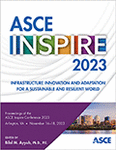Machine Learning-Based Risk Assessment for Bridge Infrastructure in Indiana
Publication: ASCE Inspire 2023
ABSTRACT
About 6% of 19,284 bridges in Indiana are rated structurally deficient. The deck area of structurally deficient bridges accounts for 3.3% of the total deck area on all structures. This deteriorating infrastructure impedes the development of a sustainable and resilient society. Therefore, there is a significant need to evaluate the risk for optimized infrastructure investment. We conduct a risk assessment for Indiana’s bridges by applying machine learning-based deterioration models with the support vector machine (SVM) and Gaussian process regression (GPR) algorithms. The machine learning-based risk assessment is able to generate a reliable risk analysis tool for bridge infrastructure in Indiana. Results from the study can provide stakeholders and decision-makers with an efficient and effective way to evaluate the performance and status of the bridge infrastructure. The outcomes of the study can be used to prioritize investment in repairing bridges based on different risk levels, save the cost of restoration, and extend the service life of the bridge infrastructure.
Get full access to this article
View all available purchase options and get full access to this chapter.
REFERENCES
ASCE. (2021). “Infrastructure report card.” https://infrastructurereportcard.org/.
Dick, K., Russell, L., Souley Dosso, Y., Kwamena, F., and Green, J. R. (2019). Deep learning for critical infrastructure resilience. Journal of Infrastructure Systems, 25(2), 05019003.
Hamad, K., Obaid, L., Haridy, S., Zeiada, W., and Al‐Khateeb, G. (2023). Factorial design–machine learning approach for predicting incident durations. Computer-Aided Civil and Infrastructure Engineering, 38(5), 660–680. https://doi.org/10.1111/mice.12883.
Hasan, S., and Elwakil, E. (2020). National bridge inventory data-based stochastic modeling for deck condition rating of prestressed concrete bridges. Practice Periodical on Structural Design and Construction, 25(3), 04020022.
McFarland, J. M. (n.d.). Uncertainty analysis for computer simulations through validation and calibration.
NBI ASCII Files: Disclaimer—National Bridge Inventory—Bridge Inspection—Safety Inspection—Bridges & Structures—Federal Highway Administration. (2022). Retrieved April 26, 2023, from https://www.fhwa.dot.gov/bridge/nbi/disclaim.cfm?nbiYear=2022/delimited&nbiState=IN22.
Oyedele, A., Ajayi, A., Oyedele, L. O., Delgado, J. M. D., Akanbi, L., Akinade, O., Owolabi, H., and Bilal, M. (2021). Deep learning and Boosted trees for injuries prediction in power infrastructure projects. Applied Soft Computing, 110, 107587.
Patle, A., and Chouhan, D. S. (2013). SVM kernel functions for classification. 2013 International Conference on Advances in Technology and Engineering (ICATE), 1–9. https://doi.org/10.1109/ICAdTE.2013.6524743.
Rasol, M., Pais, J. C., Pérez-Gracia, V., Solla, M., Fernandes, F. M., Fontul, S., Ayala-Cabrera, D., Schmidt, F., and Assadollahi, H. (2022). GPR monitoring for road transport infrastructure: A systematic review and machine learning insights. Construction and Building Materials, 324, 126686.
Tomar, A., and Burton, H. V. (2021). Active learning method for risk assessment of distributed infrastructure systems. Computer‐Aided Civil and Infrastructure Engineering, 36(4), 438–452.
Ulapane, N., Alempijevic, A., Vidal-Calleja, T., Miro, J. V., Rudd, J., and Roubal, M. (2014). Gaussian process for interpreting pulsed eddy current signals for ferromagnetic pipe profiling. 2014 9th IEEE Conference on Industrial Electronics and Applications, 1762–1767. https://doi.org/10.1109/ICIEA.2014.6931453.
Ulapane, N., Thiyagarajan, K., and Kodagoda, S. (2020). Hyper-Parameter Initialization for Squared Exponential Kernel-based Gaussian Process Regression. 2020 15th IEEE Conference on Industrial Electronics and Applications (ICIEA), 1154–1159. https://doi.org/10.1109/ICIEA48937.2020.9248120.
Weseman, W. A. (1995). Recording and Coding Guide for the Structure Inventory and Appraisal of the Nation’s Bridges. Washington, DC: USDOT.
Zhou, Y., Su, W., Ding, L., Luo, H., and Love, P. E. (2017). Predicting safety risks in deep foundation pits in subway infrastructure projects: support vector machine approach. Journal of Computing in Civil Engineering, 31(5), 04017052.
Ziari, H., Maghrebi, M., Ayoubinejad, J., and Waller, S. T. (2016). Prediction of Pavement Performance: Application of Support Vector Regression with Different Kernels. Transportation Research Record: Journal of the Transportation Research Board, 2589(1), 135–145. https://doi.org/10.3141/2589-15.
Information & Authors
Information
Published In
History
Published online: Nov 14, 2023
ASCE Technical Topics:
- Artificial intelligence and machine learning
- Bridge decks
- Bridge tests
- Computer programming
- Computing in civil engineering
- Decks
- Deterioration
- Disaster risk management
- Engineering fundamentals
- Equipment and machinery
- Field tests
- Infrastructure
- Infrastructure resilience
- Infrastructure vulnerability
- Materials characterization
- Materials engineering
- Risk management
- Structural engineering
- Structural systems
- Tests (by type)
Authors
Metrics & Citations
Metrics
Citations
Download citation
If you have the appropriate software installed, you can download article citation data to the citation manager of your choice. Simply select your manager software from the list below and click Download.
